In a bid to ease weather and climate change forecasts, scientists at MIT have developed the first fully digitally manufactured plasma sensors for orbiting spacecraft. Satellites use these plasma sensors, also known as retarding potential analyzers (RPAs), to determine the atmosphere’s chemical composition and ion energy distribution.
The 3D print sensor for satellites is a long-lasting, precise sensor that could be used effectively on low-cost, lightweight satellites known as CubeSats, which are commonly used for environmental monitoring or weather forecasting.
The research work was led by Luis Fernando Velásquez-Garcia, a principal scientist at MIT’s Microsystems Technology Laboratories (MTL), and co-researchers include lead author and MTL postdoc Javier Izquierdo-Reyes, graduate student Zoey Bigelow, and postdoc Nicholas K. Lubinsky. The study was published in the journal Additive Manufacturing.

RPAs were created by the researchers using a glass-ceramic material that is more durable than traditional sensor materials such as silicon and thin-film coatings. They were able to create sensors with complex shapes that can withstand the wide temperature swings that a spacecraft would encounter in lower Earth orbit by using glass-ceramic in a fabrication process developed for 3D printing with plastics.
The 3D-printed and laser-cut hardware performed as well as state-of-the-art semiconductor plasma sensors manufactured in a cleanroom, which is expensive and takes weeks to complete. In comparison, 3D-printed sensors can be produced in a matter of days for tens of dollars.
Speaking on the new development, the lead author, Luis Fernando Velásquez-García, said once one wants to innovate, one must be willing to fail and accept the risk. Additive manufacturing is a very different method of producing space hardware.
In his words: “If you want to innovate, you need to be able to fail and afford the risk. Additive manufacturing is a very different way to make space hardware. I can make space hardware and if it fails, it doesn’t matter because I can make a new version very quickly and inexpensively, and iterate on the design. It is an ideal sandbox for researchers.”
However, he added, “Additive manufacturing can make a big difference in the future of space hardware. Some people think that when you 3D-print something, you have to concede less performance. But we’ve shown that is not always the case. Sometimes there is nothing to trade off.




